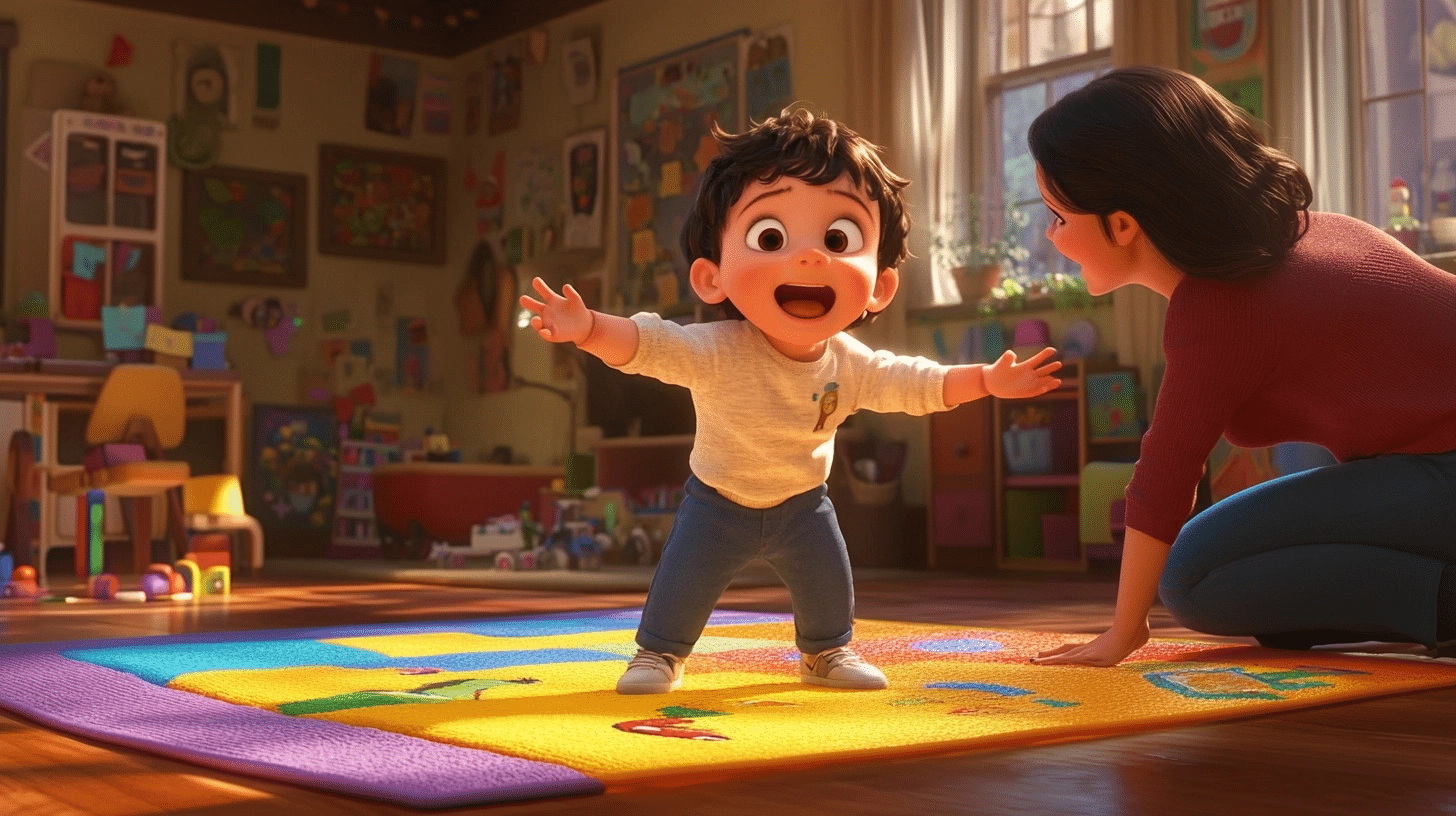Parents often worry when their little boys don’t start talking as quickly as other children. This common concern surfaces frequently: “My friend’s daughter is already speaking in sentences, but my son barely says a word!”
This timing difference is actually normal. Boys typically develop speech a bit later than girls, and each child follows their timeline for talking.
This blog will help parents understand what’s really happening with their sons’ speech development and give them an idea of when boys start talking. There are no complex charts or technical terms, just clear information about when boys typically start talking and what to expect along the way.
The following sections will cover normal speech milestones for boys, factors that affect talking timelines, and simple signs that might indicate a check with the doctor is needed.
Speech Development Milestones in Boys

Boys grow in their way when it comes to talking.
Most start with baby sounds around 2 to 3 months. They smile and coo when mom or dad talks to them.
By 6 months, many boys babble with sounds like “ba-ba” or “da-da.” These first sounds are fun to hear! Around 9 months, they may point at things they want.
The first real word often comes between 11 and 14 months, but don’t worry if your boy takes a bit longer.
By 18 months, most boys use 5 to 20 words. They might say “milk” when thirsty or “ball” during playtime.
Between 2 and 3 years, boys start putting words together. “Want juice” or “car go” shows they’re learning fast. By age 3, most boys speak in short sentences that others can understand.
Remember, these are just general times. Each boy learns to talk at his speed.
Factors Empowering Speech Development in Babies

Many factors and things signal towards how and when boys start talking. While some boys chat early, others take their time. Here’s what makes a difference:
Genetics: A Family history of late talking can play a role.
Look at your family tree. Was Dad a late talker? Maybe grandpa, too? Speech timing often runs in families. If older brothers or parents talked late, your son might follow the same path. This doesn’t mean something is wrong. It’s just his natural timeline.
Boys with family members who talked late often catch up fully by school age. They may say fewer words at first but understand many more than they can say.
A Stimulating Environment
Boys learn to talk by listening to others. Homes filled with speaking, reading, and singing help boys learn words faster. When parents chat during everyday tasks like changing diapers or making lunch, it helps.
TV and screens don’t help much with talking. Real people talking face-to-face works best. Boys need to see their mouth move and watch their face as they speak.
Hearing Difficulties Can Delay Speech Development.
Boys need to hear words clearly to say them right. Ear infections or fluid in the ears can make sounds fuzzy. If your son has many ear infections, it might slow down his talking.
Most boys have their hearing checked at birth, but hearing can change. If a boy doesn’t respond to sounds or voices, a hearing check might help.
Language Development Is Linked to Other Developmental Milestones.
Talking connects to other skills. Boys who use their hands well to point, clap, and play often speak sooner. Moving, thinking, and talking all grow together.
Some boys focus first on walking and running before they put energy into talking. This is normal, too. Many active boys may say fewer words at first but catch up quickly later.
Encouraging Speech Development in Boys
Parents can help boys learn to talk. Small steps each day make a big difference. Try these simple ways to boost your son’s talking skills:
Respond to their sounds and gestures
When your little boy makes noises or points at things, pay attention and respond. This simple act builds his trust in communication.
If he babbles “ba-ba” while looking at a bottle, say, “Yes, that’s your bottle! Are you hungry?” Watch his face light up when you understand him.
This back-and-forth teaches him that his sounds have meaning and power. Even before real words come, these early “talks” lay the foundation for speech. Your quick responses to his early attempts show him that talking works, which makes him want to do more of it.
Use simple words and phrases
Keep words short and clear when you talk to your son. Instead of “Would you like to have some apple juice in your cup?” try “Want juice?” or “Juice time!” Boys learn better with short, clear words said often.
- Name things he sees: “Ball. Red ball. Big red ball.”
- Repeat important words many times in your day
- Use words that match what he’s looking at
Narrate your activities and surroundings
Talk about what you do all day. “I’m washing your blue shirt. Now I’m folding it.” Tell him what you see: “Look at the big truck. It’s red.” This fills his day with words linked to real things.
- Describe what you’re doing during daily tasks
- Name things you see on walks or in the store
- Talk about colors, shapes, and sizes of things
- Use action words to describe what’s happening
Myth or Fact? Do Boys Talk Later Than Girls?
Research shows that boys often start talking later than girls. This isn’t just a common belief; studies back it up. On average, girls begin using words sooner and build bigger vocabularies more quickly in the early years.
A study in the Journal of Speech, Language, and Hearing Research found that at 16 months, girls typically use more words than boys.
By age 2, many girls use about 100 more words than boys the same age.
Brain development plays a role in this difference. The language areas in girls’ brains often mature a bit earlier, giving them a head start with words.
However, most boys catch up by school age. The early gap doesn’t mean boys will have speech problems later.
Each child follows their path, and many boys who start talking later end up with excellent language skills.
Fun Activities to Boost Your Boy’s Speech Skills
Looking for playful ways to help your boy express himself better? These fun, hands-on activities are designed to naturally boost his speech skills while keeping him engaged and smiling.
Play-Based Learning Games
- Follow the Leader with Sounds: Take turns making animal noises or car sounds for your child to copy. Boys often love to mimic these fun, active sounds before they use words.
- Action Figures with Voices: Use toys to act out simple scenes with basic words. “Car go!” or “Man eat!” connect play with speech.
- Ball Toss Word Game: Say a word when you throw a ball, and have your child try to say it when throwing back.
- Building Block Talk: Name each block color as you stack them. Later, ask “Which one next?” to prompt choices and words.
- Treasure Hunt: Hide toys around a room and give simple clues to find them, encouraging your child to ask “where?” when stuck.
Reading Together Daily
Reading books with your boy creates a strong foundation for speech. Pick books with bold pictures and few words on each page.
Point to pictures and name them, then pause to give your child time to respond or repeat. Don’t rush through pages – sometimes, spending five minutes on a single page while talking about what you see works better than finishing the whole book.
Books about trucks, animals, or other subjects he loves will hold his attention longer.
Narrate Your Daily Routine
Boys learn language by hearing it used in real situations. As you go through your day, talk about what you’re doing in simple terms.
“I’m washing hands now” or “Time to put on shoes” helps connect words to actions. When your child points to something, name it right away.
This simple habit fills his day with useful language without any special planning. Everyday moments often teach more than fancy activities.
Music and Movement Activities
- Action Songs: Songs like “Head, Shoulders, Knees and Toes” or “The Wheels on the Bus” pair words with movements, making them easier to remember.
- Rhythm Instruments: Beating drums while chanting simple words helps some boys feel the pattern of speech.
- Dance Breaks: Put on music and call out simple actions – “jump,” “spin,” “stop” – for a fun way to practice following verbal cues.
- Make Up Silly Songs: Create simple tunes about what you’re doing, using your child’s name often.
Turn Off The Screens
When screens are on, real talking often stops. Limit TV and tablet time to create more chances for live conversation.
Studies show that children who watch less TV tend to learn words faster. Even educational shows can’t replace the value of talking with real people who respond to a child’s attempts to speak.
When you do allow screen time, watch together and talk about what you see. Ask simple questions and point things out to make viewing more interactive.
Mealtime Conversation Starters
- Food Talk: Name foods as you eat them and describe how they taste – “sweet apple” or “crunchy cracker.”
- Choice Questions: Ask “Do you want milk or water?” instead of yes/no questions.
- Family Chat Rounds: Have each person at the table share one thing about their day, keeping it very simple for your toddler’s turn.
- I Spy at the Table: Look for colors or shapes in foods and dishes to name together.
When to Seek Professional Help
While boys often develop speech at their own pace, certain signs might indicate a need for professional assessment.
Parents know their children best, and it is important to trust your instincts about your child’s development.
If you feel concerned about your son’s speech progress, discussing it with a healthcare provider can offer peace of mind or early intervention if needed.
- No babbling by 9 months
- No first words by 15 months
- Fewer than 10 words by 18 months
- Not putting two words together by 24 months
- Loss of previously acquired speech skills at any age
- Limited understanding of simple directions by age 2
- No speech that others can understand by age 3
- Stuttering that persists for more than 6 months
- Unable to pronounce most sounds correctly by age 4
- Shows no interest in communicating or interacting with others
- Avoids eye contact consistently
- Does not respond when his name is called
- Becomes frustrated when trying to communicate
Celebrating Every Milestone: Supporting Your Child

Each step your son takes toward talking deserves celebration. The first “mama” or “dada” is just as important as his first sentence.
Notice and cheer for all the small wins along the way. When he learns a new word, uses it correctly, or tries to join a conversation, show your joy.
Taking videos or keeping a word journal can help you see his progress over time. On days when it seems like nothing is changing, look back at these records. You’ll see how far he’s come.
Remember, speech happens step by step. Each sound, word, and phrase builds toward the day he’ll tell you his own stories.
Packing It Up
Watching your son learn to talk is a wonderful part of parenthood. When do boys start talking? Each child walks their path toward speech; some dash, others stroll.
The key is knowing what’s typical while staying alert to possible concerns.
So what does this mean for you as a parent? You play a crucial role in your son’s speech expedition. The words you share, books you read, and responses you give to his attempts all build his language skills.
What’s next? Try adding one new language-boosting activity each day. Talk during bath time, name foods at dinner. Read an extra bedtime story. And if you’re worried about when your boy should start talking?
Trust your gut. A quick check with your doctor can either ease your mind or connect you with helpful resources.
















